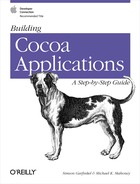This section summarizes the best of the many third-party resources that you’ll find helpful in learning more about Cocoa.
Online mailing lists are a great way to stay up-to-date on developer issues:
-
cocoa-dev Apple’s
cocoa-devis a mailing list focused exclusively on Cocoa development issues. The mailing list is a forum for both technical and nontechnical questions. Although most of the participants are outside of Apple, many people on Apple’s Cocoa development team read the mailing list and answer questions. For information on how to subscribe to this mailing list, go to:-
MacDev-1 This list is cosponsored by MacTech Magazine, Developer Depot (a retailer of programming tools), and Apple.
MacDev-1is a source of news, information, updates, and special offers for the Mac programmer community. The goals of theMacDev-1list are to make developers more aware of available programming resources and to provide vendors of Mac development tools with an efficient channel through which to spread the word about product releases. This list is moderated by the MacTech Magazine staff. For information on how to participate inMacDev-1, go to:
You’ll find the following web sites helpful:
- Mac DevCenter
Affiliated with O’Reilly & Associates, Inc., the O’Reilly Network is home to the Mac DevCenter, a hub site that offers news, FAQs, original articles, and other technical information for Mac OS X developers. Various online and offline resources aimed especially at Cocoa developers are available at:
- MacTech
The web site run by MacTech Magazine (described under Section A.2.3) contains extensive resources for Mac developers, including downloadable source code that Cocoa developers should find helpful and a web version of “MacTech Online,” a monthly column from the magazine that provides online technologies and resources. It also contains links to web pages, shareware archives, newsgroups, mailing lists, and castanet channels aimed at Macintosh programmers. Go to the home page at:
- SourceForge
SourceForge.net is the world’s largest open source development web site, with the largest repository of open source code and applications available on the Internet. SourceForge.net provides free services to open source developers, including project hosting, version control, bug and issue tracking, project management, backups and archives, and communication and collaboration resources.
There are many open source projects based on the Cocoa framework. You can explore them by searching for the word “Cocoa” in the search field on SourceForge’s home page:
We recommend that you take a look at the following books and magazines:
- Cocoa Programming for Mac OS X, by Aaron Hillegass (Addison Wesley)
Naturally, if you are buying just one book on Cocoa programming, you should buy the book you are holding in your hands. But if you are looking for another point of view, you might want to check out Aaron Hillegass’s book. Aaron was a developer trainer at NeXT and has worked on developing some fairly sophisticated Cocoa applications. Even better, just as we cover many topics not mentioned in Aaron’s book, Aaron covers many topics not mentioned in this book, making the two books quite complementary.
- Learning Cocoa, by James Duncan Davidson and Apple Computer (O’Reilly)
The first edition of this book was written by Apple Computer; a second edition was in the works as this book went to press. It provides an introduction to the Cocoa environment, taking you through the process of creating single-window applications and building up to more complex, multiple-window, document-based applications. While Learning Cocoa assumes some knowledge of C programming, the book teaches you the basic concepts of object-oriented programming with Objective-C while introducing you to Cocoa.
- Learning Carbon, by Apple Computer (O’Reilly)
Even if you plan to build your applications using Cocoa, you can still benefit from time to time by dipping into the Macintosh Core framework and Carbon layers. This book provides you with all of the information you need to access these system resources.
- Learning Unix for Mac OS X, by Dave Taylor and Jerry Peek (O’Reilly)
This concise introduction summarizes what users need to know to get started with Unix functions on Mac OS X. The book explains how to use the Terminal application, become familiar with the command-line interface, explore many Unix applications, and — most importantly — take advantage of the power of Unix on the Mac platform.
- Mac OS X for Unix Developers, by Brian Jepson and Ernest E. Rothman (O’Reilly)
Although Mac OS X is based on Unix, it is different from most standard Unix implementations. This book will help advanced Unix users acclimate themselves to this familiar, yet foreign, Unix environment; it provides information useful to Unix programmers, such as the details of linking, compiling, and packaging their applications.
- Mac OS X Pocket Reference, by Chuck Toporek (O’Reilly)
This handy book introduces Mac, Windows, and Unix users to the fundamental concepts of Mac OS X. It starts with a “Mac OS X Survival Guide,” which shows Mac users what has changed from Mac OS 9 and helps Windows and Unix converts get acclimated to their new OS. The book concludes with a “Task and Setting” index, which answers questions users might have when configuring their systems.
- Mac OS X: The Missing Manual, by David Pogue (Pogue Press/O’Reilly)
This book illuminates both the big-ticket features and the fine points of Mac OS X Version 10.1: its Unix-like folder structure, powerful networking and Internet features, and even the command-line interface of its Unix underbelly. It also covers each of the control panels and bonus programs that come with Mac OS X, including iTunes, Mail, Sherlock, and Apache, the built-in web server.
- MacTech Magazine
MacTech is a monthly print journal that presents programming articles and news about Macintosh technology and development. For subscription information, go to:
The MacTech web site was described earlier in this appendix, under Section A.2.2.
